One in nearly every two cars sold in China last year was an electric vehicle (EV), as a brutal price war between automakers and millions of dollars worth of government subsidies fuelled a record boom in sales.
EV-makers sold an unprecedented 10.97 million new energy vehicles (NEVs) in China in 2024, CarNewsChina reported, citing early sales data from the China Passenger Car Association (CPCA) showed.
Those sales meant a whopping 41.6% jump from the 7.75 million NEVs sold in China in 2023. The term NEV refers to all types of electric vehicles including battery electric vehicles (BEVs) and plug-in hybrid vehicles (PHEVs).
Also on AF: Brazil to Fine BYD For Each Worker Found Doing ‘Slave Labour’
Effectively, electric vehicles accounted for nearly half — 47.9% — of the total 22.9 million passenger cars sold in the country for the year.
By comparison, electric cars accounted for just 22.6% of all retail sales in Europe in November, the Agence France-Presse reported, citing data from the European Automobile Manufacturers’ Association.
China has remained the standout market for electric vehicles at a time when sales across the globe have largely slowed due to relatively higher purchasing costs, changing policies on incentives such as subsidies, irregular infrastructure such as charging stations and persistent inflation.
Beijing’s car trade-in subsidies have been key the growing adoption of EVs. More than 6.6 million cars sold last year benefited from government subsidies of up to $2,800 for NEV purchases versus as much as $2,000 for more fuel-efficient combustion engine vehicles.
Over 60% of the subsidised purchases went to NEVs, per official data.
On Wednesday, Chinese authorities announced an extension of the subsidies into 2025 as part of an expanded consumer trade-in scheme to revive economic growth.
“We expect the vehicle trade-in subsidy programme to boost full-year 2025 demand by 3 million units,” Deutsche Bank analyst Bin Wang said.
Market shake-out
The EV boom has spelled good fortune for local automakers such as BYD, Geely and Xiaomi, all of whom saw record sales through most of 2024.
BYD has remained the biggest seller in the Chinese market and sold more than 4 million cars at home, and abroad, according to AFP.
China’s EV boom also proved to be a boom for US electric vehicle leader Tesla, which saw its first-ever slump in global sales last year but still sold a record number of vehicles in China.
Unlike Tesla, however, other foreign automakers such as General Motors, Toyota and Volkswagen continued to lose ground to local rivals in China.
Many of them also struggled to sustain effective capacity usage at their Chinese plants.
China’s auto industry has also seen profitability deteriorate over the years. Sales profit margins fell to 4.4% in the first 11 months of 2024 from 6.2% in 2020, according to the CPCA.
An extended price war between Tesla and leading Chinese carmakers also forced suppliers and dealers to cut component prices more or offer deeper discounts.
The brutal price war is poised to continue for a third year with BYD, Tesla, Li Auto and Nio extending their sales incentives into 2025.
Exports slump
Amid the wins at home, however, China’s auto exports are estimated to slow notably this year.
China likely ranked as the world’s largest auto exporter in 2024 — despite the additional tariffs its EV-makers faced in the European Union starting late October — with car exports up 25% to 4.8 million units, according to the China Passenger Car Association (CPCA) data.
That would be a second consecutive year China would rank ahead of Japan, which saw auto exports fall 4.3% to 3.82 million vehicles in the first 11 months of 2024.
But export growth is seen cooling to 10% this year, with an expected drop in shipments to Russia adding to tariff pressure in Europe, Cui Dongshu, secretary general of CPCA, said.
EV exports are forecast to see “zero growth,” Cui said.
- Vishakha Saxena, with Reuters























